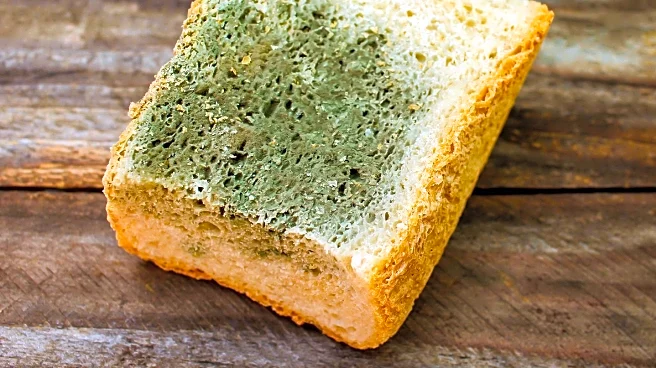What's Happening?
A toxicologist has highlighted the potential health risks associated with consuming moldy or spoiled foods. The expert explains that while it may be tempting to consume food past its prime to avoid waste,
the dangers posed by microbial toxins and biochemical by-products are significant. Spoiled foods can contain microorganisms that produce toxins, which can interfere with biological processes and lead to severe health conditions, including liver cancer. The article details how specific molds and bacteria found in foods like grains, nuts, fruits, cheese, and meats can produce harmful toxins such as aflatoxins and mycotoxins. These substances can cause a range of health issues, from mild gastrointestinal discomfort to severe organ damage.
Why It's Important?
The consumption of moldy foods poses a significant public health concern due to the potential for serious health effects. The presence of toxins like aflatoxins, which are potent carcinogens, underscores the importance of food safety and proper storage practices. This issue is particularly relevant for consumers who may be unaware of the risks associated with eating spoiled foods. The broader impact includes potential healthcare costs and the need for increased public awareness and education on food safety. The agricultural and food industries may also be affected, as they must ensure that products are free from harmful contaminants to protect consumer health.
What's Next?
Consumers are advised to be vigilant about the signs of spoilage in foods and to discard any items that appear moldy or have an unusual smell. The toxicologist recommends erring on the side of caution, especially with soft fruits and cheeses, where mold can penetrate deeply. For hard cheeses, cutting away at least one inch around the moldy spot is suggested. The food industry may need to enhance safety protocols and educate consumers on identifying and handling spoiled foods. Public health campaigns could be initiated to raise awareness about the dangers of consuming moldy foods and the importance of proper food storage.
Beyond the Headlines
The issue of food spoilage and safety has ethical and environmental dimensions, as it intersects with concerns about food waste and sustainability. Balancing the need to reduce waste with ensuring food safety is a challenge that requires careful consideration. Additionally, the legal implications for food producers and retailers in ensuring product safety could lead to stricter regulations and oversight. Culturally, there may be varying perceptions of food spoilage and safety, influencing consumer behavior and attitudes toward food consumption.










